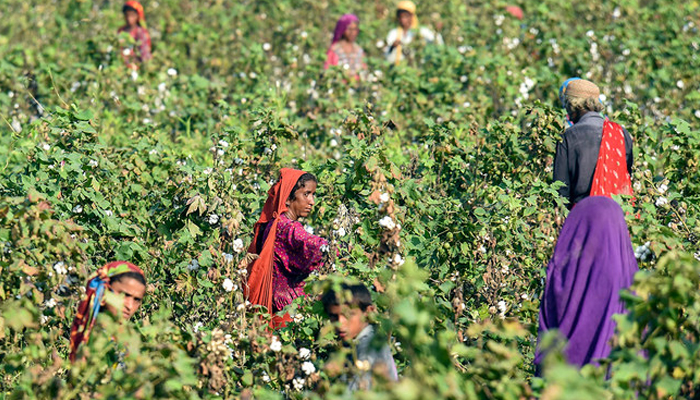Textile mills turn to tech for traceable cotton
LAHORE: The textile industry is aiming to boost its cotton quality and output by adopting new technologies and practices that ensure traceability and sustainability, the All Pakistan Textile Mills Association (APTMA) said on Friday.
APTMA North Chairman Kamran Arshad said the association has focused on improving the quality of cotton as raw material like India and Brazil to achieve high per acre yield, traceability and sustainability.
He was speaking in an interactive session on Traceable and Sustainable Cotton Initiative with Shad Mustafa, an expert who leads the Mehrgarh Cotton project.
Mustafa briefed APTMA members on how his team has achieved better cotton production under the project, which uses blockchain, GPS and drones to monitor and record the information flow on the fields.
He said traceability has become crucial for the entry of textile products in the US, where issues like child labor and human rights violations are taken very seriously by the government.
Mustafa said his team ensured crop protection, water stewardship, soil management, bio-diversity and land use, fiber quality and decent work practices at the project. A QR code was generated from the traceability system to ensure quality of production, which resulted in lower trash content of around 7.5 percent against 9 percent in the market and higher staple length than the market average.
Mustafa said his team had engaged international insurance companies for the crop insurance in case of natural disasters, as the domestic ones had no capacity to bear the claim in case of loss. He also said they used pesticides to mitigate the losses caused by pests such as white fly, jassids, armyworms and pink bollworms.
They are planning to expand the project to larger acreage in the province of Sindh and scale up to 7,000 acres under the Special Investment Facilitation Council (SIFC).
-
 Leonardo DiCaprio's Co-star Reflects On His Viral Moment At Golden Globes
Leonardo DiCaprio's Co-star Reflects On His Viral Moment At Golden Globes -
 SpaceX Pivots From Mars Plans To Prioritize 2027 Moon Landing
SpaceX Pivots From Mars Plans To Prioritize 2027 Moon Landing -
 J. Cole Brings Back Old-school CD Sales For 'The Fall-Off' Release
J. Cole Brings Back Old-school CD Sales For 'The Fall-Off' Release -
 King Charles Still Cares About Meghan Markle
King Charles Still Cares About Meghan Markle -
 GTA 6 Built By Hand, Street By Street, Rockstar Confirms Ahead Of Launch
GTA 6 Built By Hand, Street By Street, Rockstar Confirms Ahead Of Launch -
 Funeral Home Owner Sentenced To 40 Years For Selling Corpses, Faking Ashes
Funeral Home Owner Sentenced To 40 Years For Selling Corpses, Faking Ashes -
 Why Is Thor Portrayed Differently In Marvel Movies?
Why Is Thor Portrayed Differently In Marvel Movies? -
 Dutch Seismologist Hints At 'surprise’ Quake In Coming Days
Dutch Seismologist Hints At 'surprise’ Quake In Coming Days -
 Australia’s Liberal-National Coalition Reunites After Brief Split Over Hate Laws
Australia’s Liberal-National Coalition Reunites After Brief Split Over Hate Laws -
 DC Director Gives Hopeful Message As Questions Raised Over 'Blue Beetle's Future
DC Director Gives Hopeful Message As Questions Raised Over 'Blue Beetle's Future -
 King Charles New Plans For Andrew In Norfolk Exposed
King Charles New Plans For Andrew In Norfolk Exposed -
 What You Need To Know About Ischemic Stroke
What You Need To Know About Ischemic Stroke -
 Shocking Reason Behind Type 2 Diabetes Revealed By Scientists
Shocking Reason Behind Type 2 Diabetes Revealed By Scientists -
 SpaceX Cleared For NASA Crew-12 Launch After Falcon 9 Review
SpaceX Cleared For NASA Crew-12 Launch After Falcon 9 Review -
 Meghan Markle Gives Old Hollywood Vibes In New Photos At Glitzy Event
Meghan Markle Gives Old Hollywood Vibes In New Photos At Glitzy Event -
 Simple 'finger Test' Unveils Lung Cancer Diagnosis
Simple 'finger Test' Unveils Lung Cancer Diagnosis




